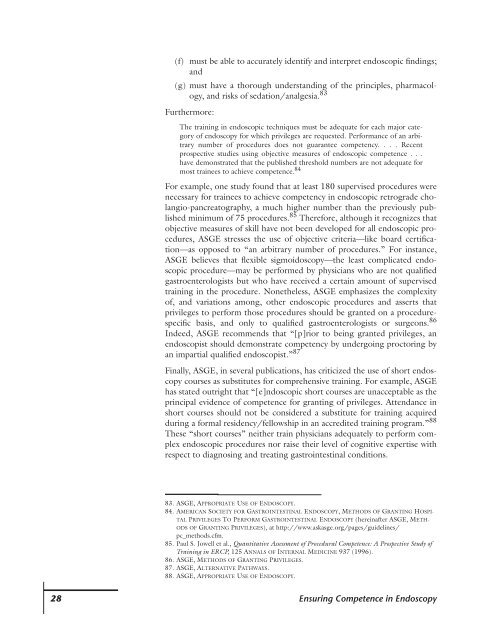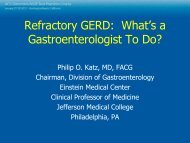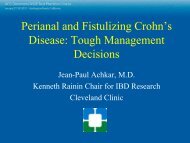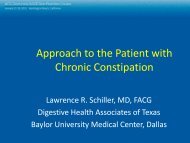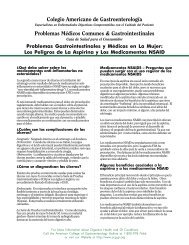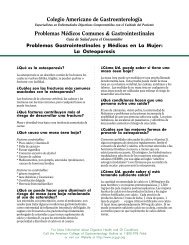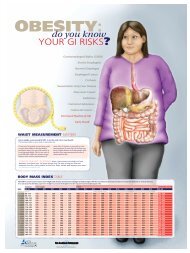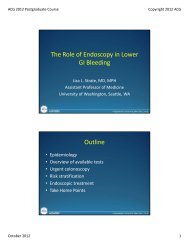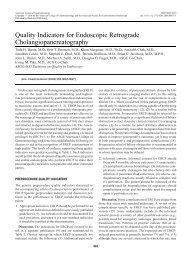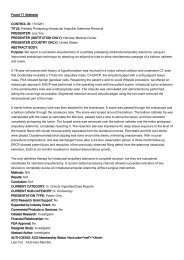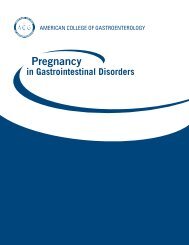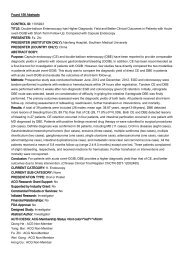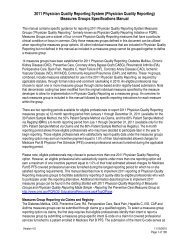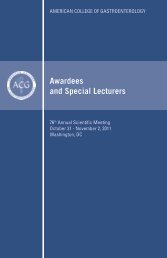Ensuring Competence in Endoscopy - American College of ...
Ensuring Competence in Endoscopy - American College of ...
Ensuring Competence in Endoscopy - American College of ...
Create successful ePaper yourself
Turn your PDF publications into a flip-book with our unique Google optimized e-Paper software.
(f) must be able to accurately identify and <strong>in</strong>terpret endoscopic f<strong>in</strong>d<strong>in</strong>gs;<br />
and<br />
(g) must have a thorough understand<strong>in</strong>g <strong>of</strong> the pr<strong>in</strong>ciples, pharmacology,<br />
and risks <strong>of</strong> sedation/analgesia. 83<br />
Furthermore:<br />
The tra<strong>in</strong><strong>in</strong>g <strong>in</strong> endoscopic techniques must be adequate for each major category<br />
<strong>of</strong> endoscopy for which privileges are requested. Performance <strong>of</strong> an arbitrary<br />
number <strong>of</strong> procedures does not guarantee competency. . . . Recent<br />
prospective studies us<strong>in</strong>g objective measures <strong>of</strong> endoscopic competence . . .<br />
have demonstrated that the published threshold numbers are not adequate for<br />
most tra<strong>in</strong>ees to achieve competence. 84<br />
For example, one study found that at least 180 supervised procedures were<br />
necessary for tra<strong>in</strong>ees to achieve competency <strong>in</strong> endoscopic retrograde cholangio-pancreatography,<br />
a much higher number than the previously published<br />
m<strong>in</strong>imum <strong>of</strong> 75 procedures. 85 Therefore, although it recognizes that<br />
objective measures <strong>of</strong> skill have not been developed for all endoscopic procedures,<br />
ASGE stresses the use <strong>of</strong> objective criteria—like board certification—as<br />
opposed to “an arbitrary number <strong>of</strong> procedures.” For <strong>in</strong>stance,<br />
ASGE believes that flexible sigmoidoscopy—the least complicated endoscopic<br />
procedure—may be performed by physicians who are not qualified<br />
gastroenterologists but who have received a certa<strong>in</strong> amount <strong>of</strong> supervised<br />
tra<strong>in</strong><strong>in</strong>g <strong>in</strong> the procedure. Nonetheless, ASGE emphasizes the complexity<br />
<strong>of</strong>, and variations among, other endoscopic procedures and asserts that<br />
privileges to perform those procedures should be granted on a procedurespecific<br />
basis, and only to qualified gastroenterologists or surgeons. 86<br />
Indeed, ASGE recommends that “[p]rior to be<strong>in</strong>g granted privileges, an<br />
endoscopist should demonstrate competency by undergo<strong>in</strong>g proctor<strong>in</strong>g by<br />
an impartial qualified endoscopist.” 87<br />
F<strong>in</strong>ally, ASGE, <strong>in</strong> several publications, has criticized the use <strong>of</strong> short endoscopy<br />
courses as substitutes for comprehensive tra<strong>in</strong><strong>in</strong>g. For example, ASGE<br />
has stated outright that “[e]ndoscopic short courses are unacceptable as the<br />
pr<strong>in</strong>cipal evidence <strong>of</strong> competence for grant<strong>in</strong>g <strong>of</strong> privileges. Attendance <strong>in</strong><br />
short courses should not be considered a substitute for tra<strong>in</strong><strong>in</strong>g acquired<br />
dur<strong>in</strong>g a formal residency/fellowship <strong>in</strong> an accredited tra<strong>in</strong><strong>in</strong>g program.” 88<br />
These “short courses” neither tra<strong>in</strong> physicians adequately to perform complex<br />
endoscopic procedures nor raise their level <strong>of</strong> cognitive expertise with<br />
respect to diagnos<strong>in</strong>g and treat<strong>in</strong>g gastro<strong>in</strong>test<strong>in</strong>al conditions.<br />
83. ASGE, APPROPRIATE USE OF ENDOSCOPY.<br />
84. AMERICAN SOCIETY FOR GASTROINTESTINAL ENDOSCOPY, METHODS OF GRANTING HOSPI-<br />
TAL PRIVILEGES TO PERFORM GASTROINTESTINAL ENDOSCOPY (here<strong>in</strong>after ASGE, METH-<br />
ODS OF GRANTING PRIVILEGES), at http://www.askasge.org/pages/guidel<strong>in</strong>es/<br />
pc_methods.cfm.<br />
85. Paul S. Jowell et al., Quantitative Assessment <strong>of</strong> Procedural <strong>Competence</strong>: A Prospective Study <strong>of</strong><br />
Tra<strong>in</strong><strong>in</strong>g <strong>in</strong> ERCP, 125 ANNALS OF INTERNAL MEDICINE 937 (1996).<br />
86. ASGE, METHODS OF GRANTING PRIVILEGES.<br />
87. ASGE, ALTERNATIVE PATHWAYS.<br />
88. ASGE, APPROPRIATE USE OF ENDOSCOPY.<br />
28 <strong>Ensur<strong>in</strong>g</strong> <strong>Competence</strong> <strong>in</strong> <strong>Endoscopy</strong>


